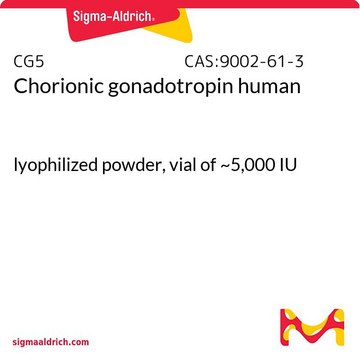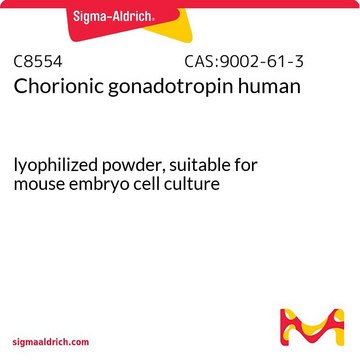C1063
Chorionic gonadotropin human
lyophilized powder, vial of ~2,500 IU
Sinónimos:
Choriogonin, HCG
Iniciar sesiónpara Ver la Fijación de precios por contrato y de la organización
About This Item
biological source:
human urine
form:
lyophilized powder
Productos recomendados
biological source
human urine
Quality Level
sterility
sterile-filtered
form
lyophilized powder
mol wt
37.9 kDa
contains
mannitol
packaging
vial of ~2,500 IU
drug control
Home Office Schedule 4.2
impurities
HBsAg, HCV and HIV-1/HIV-2, tested negative
solubility
water: 10 mL/vial, clear, colorless
UniProt accession no.
shipped in
ambient
storage temp.
−20°C
Gene Information
human ... CGA(1081)
¿Está buscando productos similares? Visita Guía de comparación de productos
General description
Glycoprotein hormone consisting of a 92-amino acid α-chain which is identical to that of LH, FSH, and TSH; and a distinct 149-amino acid β-chain. Produced by chorionic tissue and responsible for maintaining the corpus luteum during early pregnancy. Also produced by trophoblast cell neoplasms, which are marked by elevated free hCG β-chains and hyperglycosylated hCG.
Application
Chorionic gonadotropin human has been used in the biological validation of urinary testosterone (UTM) and urinary estradiol metabolites (UEM) EIA and superovulation.
Biochem/physiol Actions
Human chorionic gondadotropin (hCG) may be used as an alternative to PMSG to induce ovulation in laboratory animals. When hCG was injected into laboratory animals via intravenous (i.v.), intraperitoneal (i.p.), or subcutaneous (s.c.) methodstet, the effective dose values for 50% of the animals (ED50) per animal and per body weight (kg) in parenthesis were as follows:
Mice: i.v. 0.2 (7.7) I.U.; i.p. 0.3 (11.5) I.U.; s.c. 0.7 (26.9) I.U.
Syrian hamsters: i.v. 1.0 (9.5) I.U.; i.p. 1.8 (17.1) I.U.; s.c. 2.6 (24.8) I.U.
Rats: i.v. 1.3 (4.6) I.U.; i.p. 3.5 (12.3) I.U.; s.c.7.5 (26.3) I.U.
Using PMSG, the ED50 values per animal and per body weight (kg) in parenthesis were as follows:
Mice: i.v. 0.8 (30.8) I.U.; i.p. 2.0 (76.9) I.U.; s.c. 2.8 (107.7) I.U
Syrian hamsters: i.v., 3.6 (34.3) I.U.; i. p., 8.0 (76.2) I.U.; s.c., 13.2 (125.7) I.U.
Rats: i.v., 6.0 (76.8) I.U.; i p., 20.8 (73.0) I.U.; s.c., 76.8 (269.5) I.U.
Mice: i.v. 0.2 (7.7) I.U.; i.p. 0.3 (11.5) I.U.; s.c. 0.7 (26.9) I.U.
Syrian hamsters: i.v. 1.0 (9.5) I.U.; i.p. 1.8 (17.1) I.U.; s.c. 2.6 (24.8) I.U.
Rats: i.v. 1.3 (4.6) I.U.; i.p. 3.5 (12.3) I.U.; s.c.7.5 (26.3) I.U.
Using PMSG, the ED50 values per animal and per body weight (kg) in parenthesis were as follows:
Mice: i.v. 0.8 (30.8) I.U.; i.p. 2.0 (76.9) I.U.; s.c. 2.8 (107.7) I.U
Syrian hamsters: i.v., 3.6 (34.3) I.U.; i. p., 8.0 (76.2) I.U.; s.c., 13.2 (125.7) I.U.
Rats: i.v., 6.0 (76.8) I.U.; i p., 20.8 (73.0) I.U.; s.c., 76.8 (269.5) I.U.
Reconstitution
When reconstituted with water to a concentration of 1,000 IU/mL, the vial will also contain 0.1 M sodium phosphate buffer (pH approx. 7.2) and 100 mg/mL of mannitol.
Analysis Note
The calculated value is based on the USP method for human Chorionic Gonadotrophin, to meet 2,500 IU per vial, with a tolerance of not less than 80.0% and not more than 125.0% of the potency stated.
Storage Class
11 - Combustible Solids
wgk_germany
WGK 2
flash_point_f
Not applicable
flash_point_c
Not applicable
Elija entre una de las versiones más recientes:
¿Ya tiene este producto?
Encuentre la documentación para los productos que ha comprado recientemente en la Biblioteca de documentos.
Tsung-Yi Lin et al.
Bioorganic & medicinal chemistry, 25(20), 5790-5798 (2017-09-28)
Monoclonal antibodies (mAbs) are essential reagents for deciphering gene or protein function and have been a fruitful source of therapeutic and diagnostic agents. However, developing anticarbohydrate antibodies to target glycans for those purposes has been less successful because the molecular
Interrelationship among annual cycles of sex steroids, corticosterone and body condition in Nyctibatrachus humayuni
Joshi AM, et al.
General and Comparative Endocrinology, 260, 151-160 (2018)
Luqing Zhang et al.
PloS one, 10(3), e0120396-e0120396 (2015-03-25)
ZFN, TALENs and CRISPR/Cas9 system have been used to generate point mutations and large fragment deletions and insertions in genomic modifications. CRISPR/Cas9 system is the most flexible and fast developing technology that has been extensively used to make mutations in
Katherine M Graham et al.
Conservation physiology, 6(1), coy020-coy020 (2018-05-08)
Establishing captive breeding populations of amphibians is an important conservation strategy to safeguard against ongoing declines of wild populations and provide broodstock for reintroduction programs. The endangered dusky gopher frog (DGF) has never naturally reproduced in captivity and requires breeding
Emmet L Guy et al.
Conservation physiology, 8(1), coz113-coz113 (2020-01-16)
Many amphibian species reinitiate the processes of preparing for reproduction (e.g. oogenesis) soon after breeding indicating hormone-induced ovulation could potentially be achieved out-of-season, which would lead to higher annual fecundity compared to mono-seasonal breeding. Such strategies would be beneficial to
Nuestro equipo de científicos tiene experiencia en todas las áreas de investigación: Ciencias de la vida, Ciencia de los materiales, Síntesis química, Cromatografía, Analítica y muchas otras.
Póngase en contacto con el Servicio técnico








